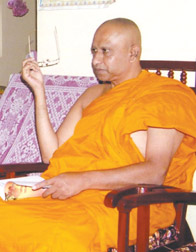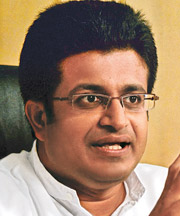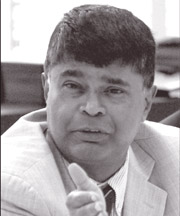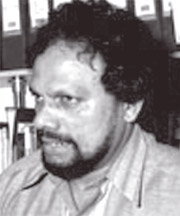|
Couched in references to Buddha’s advice:
President’s speech remarkable, courageous
by Manjula FERNANDO and Asela KURULUWANSA
|

Ven. Niyangoda Sri Vijithasiri Thera
|
President Mahinda Rajapaksa’s address to the United Nations General
Assembly citing examples from Buddha’s teachings on crisis resolution
worldwide, was a masterly performance, said Ven. Niyangoda Sri
Vijithasiri Thera, Anunayaka of the Malwatte Chapter.
The Venerable Thera said, the President in his speech reiterated the
relevance of UN principles to the tenets of Buddhism and added that the
Sri Lankans have the courage to stand on their own while the environment
conducive to such a development is being created in the country.
President Mahinda Rajapaksa’s recent landmark address to the United
Nations General Assembly in New York rekindled the glory and splendour
of Sri Lanka, said Ven. Keppeitiyagoda Siri Wimala Nayaka Thera Chief
Incumbent of Rajopawanaramaya, Getambe, Kandy.
His speech couched in references to Buddha’s advice to Lichchavi
Kings is an example to world leaders.
Since the Sri Lankans have the indomitable courage to stand up, the
country could consolidate as a powerful nation, the Thera said.
The Sunday Observer spoke to several prominent public figures to
ascertain their views on the bold and historic speech President Mahinda
Rajapaksa made at the 66th United Nations General Assembly on September
23, explaining the ground realities and challenges that Sri Lanka has to
endure and face in its quest to win peace which is as hard a task as
winning the battle against one of the ruthless and top terrorist
organisations in the world – the LTTE.
Excerpts from their comments:

Udaya Gammanpila |

Dr. Dayan Jayatilleka |

Prof. Rajiva Wijesinha |
 |
| Mohan
Samaranayake |
Dr. Dayan Jayatilleka, Ambassador Extraordinary and Plenipotentiary
to France, Portugal, the UNESCO and UNWTO; former Ambassador/Permanent
Representative to the UN in Geneva “The highlight of President
Rajapaksa’s speech was his unambiguous support, right up-front, for the
early establishment of an independent Palestinian State and the early
recognition of Palestinian independence by the UN, as well as his strong
expression of solidarity with Cuba. While it is true that these are
aspects of Sri Lanka’s Non-aligned stand, it must be recognised that it
was far easier and far less costly to take such progressive stances in
the 1960s and ’70s when it was a bi-polar world with the existence of
the Soviet Union. Today, there is far more pressure brought to bear
against States which take such bold stances, and the cost is higher.
We know from the international media that there was a huge amount of
aggressive lobbying and pressure on the Palestinian issue this time.
We also know the taboos and sensitivities on Cuba. Therefore, by his
assertions on these two subjects, President Mahinda Rajapaksa has
demonstrated that he is a courageous and principled leader, who is ready
and able to take a stand, and is determined to express his solidarity
with just international causes, whatever the pressures and blandishment
from without and within. President Rajapaksa’s encounters with
President’s Obama and Clinton and his meeting with Prime Minister
Manmohan Singh were significant not only for the cordiality revealed in
the photographs but because their conversations on post-conflict Sri
Lanka would have been mutually clarifying and constructive.”
Member of Parliament and former Head of Secretariat for Coordinating
the Peace Process Prof. Rajiva Wijesinha: I think it was particularly
important that the President pointed out to the Secretary General the
very unfair procedures that have been followed with regard to the report
prepared by the panel headed by Marzuki Darusman. Sri Lanka has been
through this type of subterfuge before, when President Jayewardene
appointed a Commission to look into allegations made against Mrs
Sirimavo Bandaranaike, claiming that this was simply a fact finding
operation, and would have no judicial powers.
Accordingly the Commission did not operate to judicial standards, and
ended up recording and regurgitating a lot of hearsay.
But then a law was rushed through Parliament to allow it to make
judicial decisions on the basis of the findings of the Commission.
Important too were the President’s remarks about the need for justice
with regard to Palestine and Cuba and Africa.
I think there was a tendency to believe that by appeasing the West we
would convince them of our good intentions, but clearly this was proving
unsuccessful.
The sad trap into which the Canadian government has fallen proves
that we really cannot trust people whose primary concerns are electoral
success where elections are governed by media soundbites.
In this regard it was good that the President pointed out that
justice for Palestinians will also make things better for Israel, so
that the ideals of people like General Rabin – whose murder shows how
effective terrorism can be, in silencing moderate voices, just as
happened in Sri Lanka when people like A. Amirthalingam and Neelan
Tiruchelvam were killed – can emerge again, instead of the divisive
short term gains that the extremists in Israel pursue. In Geneva we are
once more rebuilding the coalition that Dayan Jayatilleke established,
based on the principle that those who suffer interference are more
likely to understand our problems than those who interfere, and who have
backed terrorism in the past to achieve their own ends.
We must work together with those who suffer day after day from
terrorism to build a world order which has uniform standards, and the
President made the need for this clear.
It was good too that he noted some of the areas in which we have
begun to bring the North back to normalcy.
Our record on resettlement is better than any other in the world, and
we need to stress also the high standards of the amenities we have
provided, in particular things like education and healthcare which are
beyond the reach of the poor in many ostensibly affluent countries. The
latest issue of the Indian magazine ‘Frontline’ notes that, according to
Census Bureau Statistics, more than 42 million Americans are living in
poverty.
This is horrifying, and shows how President Barack Obama has been
overwhelmed by an establishment that does not care about human
suffering, despite the hopes we all had of greater attention to justice
when he was elected. We must make sure that all our citizens share in
the prosperity that the victory over terrorism has made possible, and
measures such as increasing minority involvement in the Security Forces,
as the President mentioned, will make it clear that we will not follow a
Western model of development, but rather, through the maxi-min principle
of traditional liberalism, will provide maximum benefits to those who
had the minimum previously. Growth in the North has been phenomenal, as
the President pointed out.
We must now make sure that the efforts of the pro-LTTE elements in
the diaspora will not slow this down and create a climate in which
terror can raise its head again.”
Sri Lanka Rupavahini Corporation Chairman and former head of UN
Information Centre Mohan Samaranayake: “Since the beginning of the
separatist militancy in the North in this country, that development was
interpreted by West powers, and their funded NGOs, the so-called civil
society activists.
All leaders except the present President whenever they addressed
international gatherings such as the UNGA, they also fell in line with
that Western interpretation. Since he started addressing international
fora, it was only President Rajapaksa who was bold enough to express our
own views and brief the international community at any given opportunity
with regard to the true picture and the ground realities of our
situation.
For instance when he addressed the UNGA in 2008, during the height of
the battle against the LTTE, he clearly explained that our fight was
against terrorism not against the Tamil speaking people.
He clearly put forth before the international community that the
problem facing Sri Lanka was a terrorist issue. He is the only State
leader in recent times who was bold enough to say this in the presence
of international gatherings whose general idea is basically interpreted
by Western interests.
This year’s address I see as a continuation of this stance. There
were a number of important points that he stressed during the speech to
the State leaders at the UNGA. One is the point that he made of powerful
States that they cannot suppress justice to small nations. He made it
clear if powerful nations act like this, it will deny fairplay and
justice to weaker Members of the UN. He also stressed that the duplicity
adopted by powerful nations can lead to the erosion of confidence in the
UN by the global community. Clearly this has been happening for some
time. The UN which has been established with very noble intentions in
mind has now been seen as a tool by the powerful countries to interfere
in internal matters of weaker States, sometimes to wage war against
certain countries they don’t like.
This is happening. The President warned if that happens it will lead
to the erosion of confidence in the UN.For example, there was a
predecessor to the UN - the ‘League of Nations’ established in 1919. It
did not last long since the powerful countries used it as a tool to
dominate the rest of the world.
Another good point he made is that Sri Lanka has embarked upon a
peace building exercise after winning the war against the LTTE. He said
this was as hard as winning the war and that it takes time. He urged the
international community to understand the challenges facing post
conflict Sri Lanka. It was a very bold and clear message.
The speech he delivered can be of great help, at least, to minimise
if not eliminate the bad image being built by anti Sri Lankan and pro
LTTE forces here and overseas.”
JHU member and Provincial Council Minister Udaya Gammanpila: “The
President’s speech at the 66th session of the UN became the voice of the
silent majority. Although the UN is an organization of 193 member
States, it is now a tool of Western traditional powers such as USA, UK
and France. It has clearly been established with regard to their conduct
in alleged war crimes by Sri Lanka.
When the UN Security Council and UN Human Rights Commission rejected
the resolutions against Sri Lanka, the Western Powers should have given
their campaign up.
Instead, they used the Secretary General to appoint a committee led
by Marzuki Darusman to revive the war crime allegations while being
silent about obvious war crimes committed by Israel against Palestine
and US led forces in Iraq and Afghanistan. The President was brave
enough to challenge this illegal process stating the UN approaches are
tainted by an unacceptable degree of selectivity.
The most remarkable feature of the President’s speech is its
philosophical aspect. He has challenged the Western supremacy in
attitude formation. Therefore, he said that traditional values of
individual societies cannot be distorted or diluted under the guise of
human rights because it itself would amount to the violation of human
rights in fundamental sense.
Sri Lanka’s association with Buddhism is unique. We have been
practising Buddhism as the majority’s religion for the last 2,300 years.
No other nation has been practising one religion as the majority’s
religion for such a long time.
Therefore, the President has correctly given a Buddhist outlook to
his speech to reflect this unique relationship. In summary, the
President has become a model for other nations in the third world to
follow with regard to facing the threats posed by the Western powers.”
|

